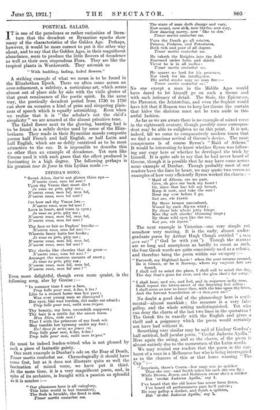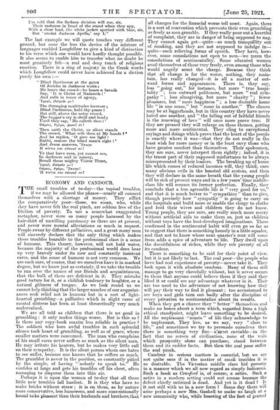POETICAL SALADS.
IT is one of the paradoxes or rather curiosities of litera- ture that the decadent or Byzantine epochs show many of the characteristics of the Golden Age. Perhaps, hewever, it would be more correct to put it the other way about, and to say that the Golden Ages, in their magnificent abundance, seem to produce the little flowers of decadence as well as their own stupendous Flora. They are like the tropical plants in Wordsworth. They astonish us
" With budding, fading, faded flowers."
A striking example of what we mean is to be found in the Elizabethan Epoch. There we often come across an over-refinement, a subtlety, a meticulous art, which seems almost out of place side by side with the virile glories of that great renaissance of the poetic spirit. In the same way, the poetically decadent period from 1730 to 1790 can show on occasion a kind of prim and simpering plain- ness of speech which is equally astonishing. Even when we realize that it is " the scholar's not the child's simplicity " we are amazed at the almost primitive tone.
The faded flower next to the glowing, bursting bud is to be found in a subtle device used by some of the Eliza- bethans. They made in their Byzantine moods composite poems half French and half English, or half Latin and half English, which are so deftly contrived as to be most attractive to the ear. It is impossible to describe this as other than an example of decadence. Yet men like Greene used it with such grace that the effect produced is fascinatinaa in a high degree. The following perhaps is his greatest tour de force in this Lydian mode
INFIDA'S SONG.
" Sweet Adon, dar'st not glance thine eye- N'oserez WWI, mon bel ami ? Upon thy Venus that must die ? Je vents en prie, pity me ; .N'oserez vous, mon bel, men bel, N'oserez vous, mon bel ami ?
Foe how sad thy Venus lies- N'oserez von., men bel ami ? Love in heart, and tears in oyes ; Je mete en prie, pity me ; N'oserez vous, mon bel, mon bel, N'oserez Vous, mon bel ami ?
Thy face as fair as Paphos' brooks-
N.'oserez voce, mon bel anti ?- Wherein fancy baits her hooks ;
Je vous en prie, pity me ; N'oserez volts, mon bel, mon bel, N'oserez volts, mon bel ami Thy checks like cherries that do grow- N'oserez vous, mon bel ami •
Amongst the western mounts of snow ; Jo volts en prie, pity me ;
N'oserez volts, mon bel, mon bel, N'oserez vous, mon bel ami 1"
Even more delightful, though even more quaint, is the following song, also by Greene :— " In summer time I saw a face,
Trop belle pour moi, h las I Like to a stoned horse was her pace ; Was ever young man so dismayed ? Her eyes, like wax torches, did make me afraid Trop belle pour moi, voild mon tripas.
Thy beauty, my love, exceedeth supposes ; Thy hair is a nettle for the nicest roses. Mon Dieu, aide moi
That I with the primrose of my fresh wit May tumble her tyranny under my feet : He! done je Berti un jcune roi.
Trop belle pour moi, haus, haas I Trop belle pour moi, voild mon tr;pas."
He must be indeed leaden-witted who is not pleased by such a piece of fantastic gaiety. . Our next example is Dunbar's ode on the Fear of Death, Timor mortis conturbat me. Chronologically it should have come first, but as it does not illustrate quite so well the fascination of mixed verse, we have put. it third. At the same time, it is a very magnificent poem, and, in spite of its archaism, is fraught with a passion as splendid as it is sombre :- " Our pleasance here is all vainglory, This false world is but transitory, The flesh is brucide, the fiend is slee. Timor mortis conturbat me.
The state of man doth change and vary, Now sound, now sick, now blythe, now wiry, Now dancing merry, now ' like to dee.' Timor mortis conturbat ins.
Unto the Death go all estates, Princes, Prelates, and Potestates, Both rich and poor of all degree. Timor mortis conturbat me.
He taketh the Knights into the field Enarmed under helm and shield. Victor he is in all molloe : Tumor mortis conturbat Ho spares no lord for his prossnco, Nor clerk for his intelligence.
His awful stroke may no man flee :- Timor mortis conturbat ms."
No one except a man in the Middle Ages would have dared to let himself go on such a theme and with such intimacy of detail. The Stoic, the Epicurean, the Platonist, the Aristotelian, and even the Sophist would have felt that if Reason was to keep her throne the curtain that hides the skeleton must not be torn aside in this awful fashion.
As far as we are aware there is no example of mixed verse in the eighteenth century, though possibly some correspon- dent may be able to enlighten us on this point. It is not, indeed, till we come to comparatively modern times that we find a conscious revival of Greene's device. The most conspicuous is of course Byron's " Maid of Athens." It would be interesting to know whether Byron was follow- ing any copy here or whether he developed the trick by himself. It is quite safe to say that he had never heard of Greene, though it is possible that he may have come across some example of Dunbar. Though probably most of our readers have the lines by heart, we may quote two verses as examples of how very efficiently Byron worked the charm :- - " Maid of Athens, are wo part,
Give, oh give me back my heart Or, since that has loft my breast, Keep it now, and take the rest ! Hear my vow before I go,
Zenj usu, was ciyaril
By those tresses unconfined, Wooed by each /Egean wind ; By those lids whose jetty fringe Kiss thy soft cheeks' blooming tinge ; By those wild eyes like the roe,
Zco?) nov, cras. ct-yara."
The next example is Victorian—one very simple yet somehow very moving. It is the early, almost under- graduate poem by Arthur Hugh Clough entitled " o OcJI ;Lent aoti! " (" God be with you "). Though the stanza' arc so long and amorphous as hardly to count as such, the four Greek words are quite consciously used as a refrain, and therefore bring the poem within our category :— " Farewell, my Highland lassie ! when the year returns around, Be it Greece, or be it Norway, whore my vagrant feet are found,
I shall call to mind the place, I shall call to mind the day, The day that's gone for ever, and the glen that's far away."
" I shall hear, and see, and foel, and in sequence sadly true, Shall repeat the bitter-sweet of the lingering last adieu ; I shall seem as now to leave thee, with the kiss upon thy brow, And the fervent benediction of-6 061 Ater& coal' No doubt a good deal of the phraseology here is senti- mental—almost mawkish ; the measure is a very fain; gallop, and the whole setting undistinguished. Yet who can deny the charm of the last two lines in the quotation ? The Greek fits in exactly with the English and gives a thrill and a poignancy which the poem would certainly not have had without it.
Something very similar may be said of Lindsay Gordon's half satirical, half jocular poem, " Credat Judaeus Apella." Here again the swing, and so the charm, of the poem is almost entirely due to the momentum of the Latin words. We may remind our readers that the poem is the out- burst of a man in a Melbourne bar who is being interrogated as to the chances of this or that horse winning " The Cup " :- "Imprimis, there's Cowra—few nags can go quicker Than she can—and Smith takes his oath she can fly While Brown Jones, and Robinson swear she's a sticker But credal Judaeus Apella,' Bay I.
I've heard that the old horse has never been fitter, I've heard all performances past he'll outvie ; He may gallop a docker, and finish a splitter, But oredat Judaeus Apella,' say
I'm told that the Sydney division will rue, sir,
Their rashness in front of the stand when they spy, With a clear lead, tha white jacket spotted with blue, sir, But credat Judaeus Apella,' say L"
The last example we will quote touches very different ground, but none the less the device of the mixture of languages enabled Longfellow to give a kind of distinction to his verse which one would have hardly thought possible. It also seems to enable him to transfer what no doubt he most genuinely felt—a real and deep touch of religious emotion. There is a ring of majesty in the Greek words which Longfellow could never have achieved for a diction purely his own :- "Blind Bartimeus at the gates
Of Jericho in darkness waits He hears the crowd—he hears a breath Say, ' It is Christ of Naie.reth 1 ' And calls in tones of agony,
e9tencn6v /Lc!
The thronging multitudes increase ; Blind Partimeus, hold thy peace But still, above the noisy crowd,
The beggar's cr4, is shrill and loud;
Until they say, He calloth thee 1'
Ocipoct, tyiepe, OWYEZ eel
, Then saith the Christ, as silent stands The crowd, What wilt thou at My hands And he replies, ` 0 give me light ! Rabbi, restore the blind man's sled 1' And Jesus answers, -Twayil H Tient crov criourxe act
Ye that have eyes, yet cannot see, In darkness and in misery., Recall those mighty Voices Throe, Ablotiv /Le!
Ociptra, OyEspe, -Thra7e!
'H rlo.rts use a4oceich ea 1



































 Previous page
Previous page